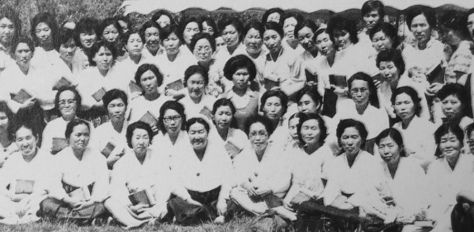By Darrin J. Rodgers. Originally published on PE-News, 02 November 2017 and on Flower Pentecostal Heritage Center.

Yoido Full Gospel Church (YFGC), with 830,000 members, is well-known for being the largest church in the world. The Assemblies of God congregation, located in Seoul, South Korea, was started by Yonggi Cho in 1958. However, some readers may be surprised to learn that the congregation’s growth is due in large part to the ministry of women. In a 1979 Pentecostal Evangel article, Yonggi Cho shared how the Holy Spirit prompted him to train and empower women ministers — despite the negative view of Korean culture toward women leaders. These women became the backbone of the church’s cell group structure.
Yonggi Cho’s ministry in Seoul began with dreams and visions. As a newly minted Bible college graduate, he had a dream that he was going to someday pastor the largest church in Korea. People scoffed at this dream, which he believed God had given to him. He worked very hard, and after six months he had used all of his sermons and wore himself out.
The young pastor became depressed and grew uncertain of his calling. Up to that point, Yonggi Cho had believed that he had already “graduated” from the “school of the Holy Spirit.” He believed that he could build the church through his own efforts. In desperation, Yonggi Cho cried out to God, seeking guidance for his life and ministry. He sensed God respond, “The Holy Spirit is the senior partner in your ministry. You are the junior partner. Every minute you must recognize Him, welcome Him, and the Holy Spirit will flow through you and bring sinners to your church.”
This realization of the importance of depending on the Holy Spirit was a turning point in Yonggi Cho’s ministry. As he drew close to God, he could sense God’s leading. Doors opened up, countless thousands of people came to faith in Christ, and the church grew.
However, Yonggi Cho began to grow prideful. He was in his 20s and already had 2,500 church members. But with this pride came a fall. He again wore himself out, unable to keep up with the demands of a large and growing congregation. He sensed the Lord direct him to delegate some of his pastoral duties to laypersons, who would establish cell groups that would meet in homes across Seoul.
At first, Yonggi Cho approached various men in the congregation to become leaders of cell groups. The men declined, responding that they lacked proper training and that they did not want to invade the privacy of their homes. They additionally noted, “We pay you to do that kind of work.”
Again discouraged, Yonggi Cho turned to the Lord in prayer. He sensed the Holy Spirit tell him, “Why don’t you try a woman?” He argued with the Lord, replying, “Try a woman! This is not America: this is Korea. In Korea women cannot have leadership.” God began to work in Yonggi Cho’s heart to overcome his cultural prejudice regarding women.

From that moment, Yonggi Cho began to take notice of the numerous examples of women ministers in Scripture. Previously he allowed his culture’s prohibition of women leaders to blind him to the biblical warrant for women in ministry.
Yonggi Cho shared his vision for cell group ministry with some women in the church, and they eagerly asked how they could assist. He began training women how to preach and lead, and women became the backbone of YFGC’s cell groups. The cell groups multiplied rapidly, fueling the congregation’s growth.
Outsiders who marvel at Yoido Full Gospel Church’s size often ask about the senior pastor or the church building, wondering what caused such growth. But Yonggi Cho, in his 1979 Pentecostal Evangel article, instead pointed to the cell groups, led largely by women, which he identified as vital to the church’s growth.
Read Yonggi Cho’s article, “God Gave Me a Dream,” on pages 8 to 11 of the Nov. 4, 1979, issue of the Pentecostal Evangel.
 Darrin J. Rodgers has served as director of the Flower Pentecostal Heritage Center (FPHC) since 2005. He earned a master’s degree in theological studies from Assemblies of God Theological Seminary and a juris doctorate from the University of North Dakota School of Law. He previously served at the David du Plessis Archive and the McAlister Library at Fuller Theological Seminary. He is the author of Northern Harvest , a history of Pentecostalism in North Dakota. His FPHC portfolio includes acquisitions, editing Assemblies of God Heritage magazine, and conducting oral history interviews. His wife, Desiree, is an ordained AG minister.
Darrin J. Rodgers has served as director of the Flower Pentecostal Heritage Center (FPHC) since 2005. He earned a master’s degree in theological studies from Assemblies of God Theological Seminary and a juris doctorate from the University of North Dakota School of Law. He previously served at the David du Plessis Archive and the McAlister Library at Fuller Theological Seminary. He is the author of Northern Harvest , a history of Pentecostalism in North Dakota. His FPHC portfolio includes acquisitions, editing Assemblies of God Heritage magazine, and conducting oral history interviews. His wife, Desiree, is an ordained AG minister.

